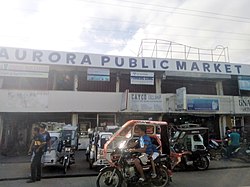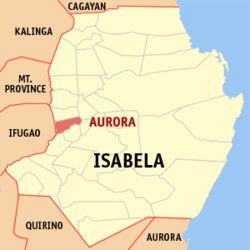Aurora, Isabela
Aurora, officially the Municipality of Aurora (Ilocano: Ili ti Aurora; Tagalog: Bayan ng Aurora), is a 3rd class municipality in the province of Isabela, Philippines. According to the 2015 census, it has a population of 35,017 people.[3]
Aurora | |
|---|---|
| Municipality of Aurora | |
 Aurora Public Market | |
 Map of Isabela with Aurora highlighted | |
OpenStreetMap 
| |
.svg.png) Aurora Location within the Philippines | |
| Coordinates: 16°59′31″N 121°38′08″E | |
| Country | |
| Region | Cagayan Valley (Region II) |
| Province | Isabela |
| District | 5th District of Isabela |
| Barangays | 33 (see Barangays) |
| Government | |
| • Type | Sangguniang Bayan |
| • Mayor | Joseph Christian G. Uy |
| • Vice Mayor | Melvin S. Martin |
| • Congressman | Faustino Michael Carlos T. Dy III |
| • Electorate | 23,845 voters (2019) |
| Area | |
| • Total | 115.56 km2 (44.62 sq mi) |
| Population (2015 census)[3] | |
| • Total | 35,017 |
| • Density | 300/km2 (780/sq mi) |
| • Households | 8,434 |
| Economy | |
| • Income class | 3rd municipal income class |
| • Poverty incidence | 10.75% (2015)[4] |
| • Revenue (₱) | 98,855,075.76 (2016) |
| Time zone | UTC+8 (PST) |
| ZIP code | 3316 |
| PSGC | |
| IDD : area code | +63 (0)78 |
| Climate type | tropical rainforest climate |
| Native languages | Ilocano Tagalog |
| Website | www |
Barangays
Aurora is politically subdivided into 33 barangays. [2] It became a municipal district on August 27, 1927.
- Apiat
- Bagnos
- Bagong Tanza
- Ballesteros
- Bannagao
- Bannawag
- Bolinao
- Santo Niño (Caipilan)
- Camarunggayan
- Dalig-Kalinga
- Diamantina
- Divisoria
- Esperanza East
- Esperanza West
- Kalabaza
- Rizalina (Lapuz)
- Macatal
- Malasin
- Nampicuan
- Villa Nuesa
- Panecien
- San Andres
- San Jose (Poblacion)
- San Rafael
- San Ramon
- Santa Rita
- Santa Rosa
- Saranay
- Sili
- Victoria
- Villa Fugu
- San Juan (Poblacion)
- San Pedro-San Pablo (Poblacion)
Demographics
| Year | Pop. | ±% p.a. |
|---|---|---|
| 1939 | 3,185 | — |
| 1948 | 7,797 | +10.46% |
| 1960 | 13,797 | +4.87% |
| 1970 | 16,035 | +1.51% |
| 1975 | 18,337 | +2.73% |
| 1980 | 20,322 | +2.08% |
| 1990 | 24,903 | +2.05% |
| 1995 | 26,385 | +1.09% |
| 2000 | 28,836 | +1.92% |
| 2007 | 31,547 | +1.25% |
| 2015 | 35,017 | +1.31% |
| Source: Philippine Statistics Authority[3][5][6][7] | ||
In the 2015 census, the population of Aurora, Isabela, was 35,017 people,[3] with a density of 300 inhabitants per square kilometre or 780 inhabitants per square mile.
Climate
| Climate data for Aurora, Isabela | |||||||||||||
|---|---|---|---|---|---|---|---|---|---|---|---|---|---|
| Month | Jan | Feb | Mar | Apr | May | Jun | Jul | Aug | Sep | Oct | Nov | Dec | Year |
| Average high °C (°F) | 31 (88) |
31 (88) |
32 (90) |
34 (93) |
35 (95) |
34 (93) |
32 (90) |
32 (90) |
32 (90) |
32 (90) |
32 (90) |
31 (88) |
32 (90) |
| Average low °C (°F) | 22 (72) |
22 (72) |
22 (72) |
24 (75) |
24 (75) |
24 (75) |
24 (75) |
24 (75) |
24 (75) |
23 (73) |
23 (73) |
22 (72) |
23 (74) |
| Average precipitation mm (inches) | 13.6 (0.54) |
10.4 (0.41) |
18.2 (0.72) |
15.7 (0.62) |
178.4 (7.02) |
227.9 (8.97) |
368 (14.5) |
306.6 (12.07) |
310.6 (12.23) |
215.7 (8.49) |
70.3 (2.77) |
31.1 (1.22) |
1,766.5 (69.56) |
| Average rainy days | 3 | 2 | 2 | 4 | 14 | 16 | 23 | 21 | 24 | 15 | 10 | 6 | 140 |
| Source: World Weather Online[8] | |||||||||||||
gollark: Alas, I was late.
gollark: https://github.com/SquidDev-CC/CC-Tweaked/blob/master/src/main/resources/assets/computercraft/lua/rom/programs/advanced/multishell.lua
gollark: I don't see why you have a problem with actually *asking* the user. Surely they would know.
gollark: jakedacatman: inconvenience yourself so you collect <:kst:665040403224985611>200 from yourself.
gollark: It's not a "court", that would imply that it has any due process whatsoever.
References
- "Municipality". Quezon City, Philippines: Department of the Interior and Local Government. Retrieved 31 May 2013.
- "Province: Isabela". PSGC Interactive. Quezon City, Philippines: Philippine Statistics Authority. Retrieved 12 November 2016.
- Census of Population (2015). "Region II (Cagayan Valley)". Total Population by Province, City, Municipality and Barangay. PSA. Retrieved 20 June 2016.
- "PSA releases the 2015 Municipal and City Level Poverty Estimates". Quezon City, Philippines. Retrieved 1 January 2020.
- Census of Population and Housing (2010). "Region II (Cagayan Valley)". Total Population by Province, City, Municipality and Barangay. NSO. Retrieved 29 June 2016.
- Censuses of Population (1903–2007). "Region II (Cagayan Valley)". Table 1. Population Enumerated in Various Censuses by Province/Highly Urbanized City: 1903 to 2007. NSO.
- "Province of Isabela". Municipality Population Data. Local Water Utilities Administration Research Division. Retrieved 17 December 2016.
- "Roxas, Isabela: Average Temperatures and Rainfall". World Weather Online. Retrieved 31 October 2015.
External links
- Aurora Profile at PhilAtlas.com
- Municipal Profile at the National Competitiveness Council of the Philippines
- Aurora at the Isabela Government Website
- Local Governance Performance Management System
- Philippine Standard Geographic Code
- Philippine Census Information
- Municipality of Aurora
This article is issued from Wikipedia. The text is licensed under Creative Commons - Attribution - Sharealike. Additional terms may apply for the media files.